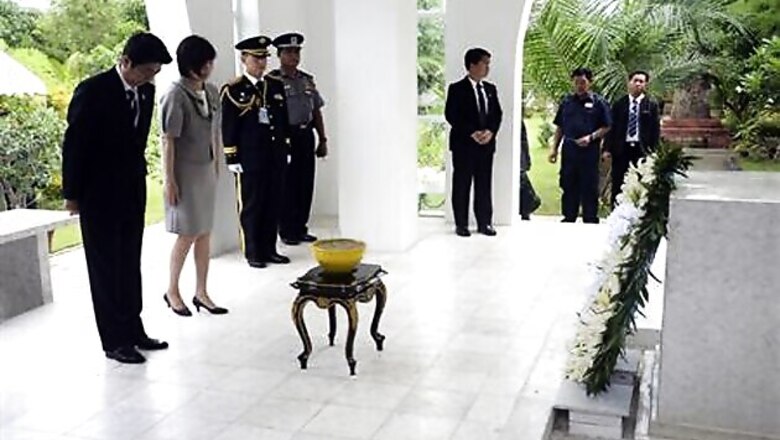
views
Japanese Prime Minister Shinzo Abe will likely skip visiting a shrine for war dead on a traditional remembrance day this month, a move he hopes will open the door to a summit with Chinese President Xi Jinping and mend badly frayed ties.
Whether Xi, faced with huge domestic challenges, is willing or able to risk responding to the overture remains in doubt. But relations between the world's second- and third-largest economies have now been hostile for months, with a row over disputed islands adding to wartime bitterness and a regional rivalry.
China and South Korea, occupied or colonised by Japan in the 20th century, are especially touchy about visits to Yasukuni Shrine by Japanese leaders because it also honours people convicted as war criminals by an Allied tribunal.
Conservatives like Abe say it is only natural to pay respects there to those who died for their country, especially on Aug 15, the anniversary of Japan's defeat in World War Two. Tokyo hopes that if Abe stays away on the day, it would score points in Beijing.
"Now is the most delicate time," said a government source with knowledge of discussions between Japan and China, who did not want to be identified because of the sensitivity of the subject. "It may be that when a leaders' summit takes place, we look back and say 'that was the start'."
Abe, 58, is keen to replicate one of the few successes of his troubled 2006-2007 term, when he thawed Sino-Japanese ties after a five-year chill during the tenure of his predecessor, Junichiro Koizumi, diplomatic experts say.
"Despite the hawkish persona that he puts forward, in 2006 he was the guy who began the post-Koizumi reconciliation process," said Sheila Smith, a senior fellow at the US-based Council on Foreign Relations. "He sees himself as a statesman in the sense of being effective on the diplomatic scene."
Sino-Japanese ties went into a deep-freeze during Koizumi's term partly because of his annual visits to Yasukuni.
The deeply conservative Abe was able to warm up relations thereafter by never saying whether he would or would not visit Yasukuni, but in fact, staying away while in office.
Abe has since said he regretted that decision and visited Yasukuni after becoming ruling party leader in September.
Even if he does not visit the shrine in August, he would face pressure from his conservative base to visit the religious complex in central Tokyo in October at an autumn festival.
CREATIVE AMBIGUITY
Chinese state media, however, have issued a barrage of invective against Abe in recent weeks even as back-door diplomacy took place over repairing ties. The country's Foreign Ministry has accused him of simply "chanting empty slogans" in his push for talks with Xi.
China - which officially denies that any talks on a possible summit are taking place and shown no public signs of wanting one - may want assurances that Abe won't attend the shrine once a summit is done and dusted.
"The question of timing is pretty critical," CFR's Smith said. "If Abe goes (to Yasukuni) in October, it is disastrous for Xi if they are talking about a summit in September."
Japan-China ties took their latest nose-dive after Abe's predecessor nationalised the uninhabited isles in the East China Sea that are controlled by Japan but claimed by both countries.
Still, several Japanese politicians and officials, starting with Abe's junior coalition partner in January, have visited Beijing since he returned to office in December.
Plans for a trip to Beijing in May by Masahiko Komura, the vice president of Abe's Liberal Democratic Party were dropped after Finance Minister Taro Aso, who is also deputy prime minister, Taro Aso, visited Yasukuni in April.
But the diplomatic pace picked up in June, when Abe's foreign policy adviser Shotaro Yachi visited Beijing. Another adviser, Isao Iijima, followed suit last month ahead of an upper house election that cemented Abe's grip on power.
And on Tuesday, Japanese Vice Foreign Minister Akitaka Saiki, met Chinese Foreign Minister Wang Yi in Beijing.
For the leaders to meet, though, diplomats would have to exercise some deft verbal footwork find a formula that allows them to dial down tensions over the disputed East China Sea isles, known as the Senkaku in Japan and the Diaoyu in China.
Japanese and Chinese ships and planes have been playing a risky game of cat-and-mouse near the islands, and activists from both sides are eyeing trips to the area around Aug 15.
China wants Japan first to acknowledge that a formal dispute over sovereignty exists, experts say, a step that Tokyo has rejected for fear it would undermine its claim.
Ambiguity could well be the easiest path to avoiding domestic backlashes, especially in China where public antipathy to Japan is running high. "Face-saving is involved," said a former Japanese diplomat. "Creative nuances might be necessary."
September could be one window for a summit, but sceptics note that Xi has his hands full with an economic slowdown, planned economic reforms, an anti-corruption campaign and a party plenum in September or October.
Doubts in Beijing about Abe's sincerity also run deep.
"Abe is being two-faced," said Li Xiushi at the Shanghai Institute of International Studies, which advises the government on foreign policy. "On one hand, he wants to strengthen the containment of China in the global arena ... On the other hand, he wants to pretend to the international and domestic audience: 'See how good my attitude is. I'm willing to negotiation. Only China is the tough one.' He wants to create this illusion














Comments
0 comment